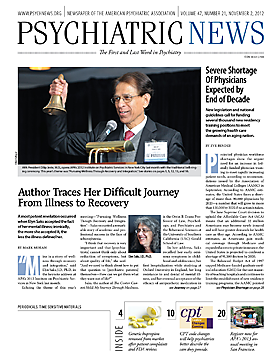If psychiatrists want to be more effective and help a much larger number of people, they need to work in a model of integrated care where they can collaborate closely with primary care physicians, said psychiatrist Jürgen Unützer, M.D., M.P.H., at APA’s 2012 Institute on Psychiatric Services in New York last month.
An internationally known psychiatrist and health services researcher and director of the AIMS Center (Advancing Integrated Mental Health Solutions) at the University of Washington, Unützer described innovative models of care that integrate mental health and general medical services. He presented evidence that psychiatrists working in a consultative way with primary care can significantly improve mental health care for large populations of people in primary care, while also lowering overall health care costs.
“In a collaborative-care model, we as psychiatrists can help our colleagues in primary care make a big difference and improve the lives of the patients they are seeing,” Unützer said.
Unützer’s presentation, titled “Integrated Behavioral Health Care: Closing the Gap Between What We Know and What We Do,” was part of the institute’s integrated-care track that included more than 20 presentations about what is a rapidly developing sub-specialty area. Integrated or collaborative care is a feature of the delivery-system reforms in the health care reform law, and policymakers and many clinicians have converged on the idea that the full range of medical services should be brought together in one patient-centered location.
Unützer said that for psychiatrists, the need for a better model of care is based on three essential facts: most patients with mental health problems do not see a psychiatrist, and primary care serves as the “de facto” system of mental health care; mental disorders are rarely the only health problem of people seen in primary care settings, and they are complicated by multiple acute and chronic medical conditions; and the current system offers poor coordination of primary care, specialty mental health care, substance abuse services, and community-based and social-service systems.
He cited findings from the National Comorbidity Survey Replication published in the June 2005 Archives of General Psychiatry showing that among people living with a DSM-diagnosed mental illness in the community, only 41 percent had gotten care and had had any contact with a mental health professional.
“If you look specifically at how many saw a psychiatrist, it’s about 12 percent,” he said. “That’s a big challenge to me as a psychiatrist…. I think we are a small part of the answer, and if we don’t find other ways to reach people with mental health problems, we are going to be considered irrelevant.”
So What Works?
Unützer described an impressive record of success for a model of patient-centered collaborative care in which psychiatrists play a consultative role with primary care physicians advising how best to treat whole populations of patients with mental health and other medical conditions.
In this way, he said, psychiatrists can impact the overall health care and medical costs of thousands of patients, compared with the relatively small number a psychiatrist can see in traditional office visits. Principles of the model include the following:
•.
Patient-centered care through close collaboration of mental health and primary care providers
•.
Population-based care in which patients are tracked in a registry
•.
“Measurement-based treatment to target,” which means that treatments are actively changed until clinical goals are achieved
•.
Use of evidence-based treatments
•.
A system of accountable care in which providers are reimbursed for quality of care and clinical outcomes, not just the volume of care provided.
“This is a promising model that aims to reinvent primary care so that it is accessible, continuous, comprehensive, coordinated, and delivered in the context of family and community,” Unützer said.
IMPACT Shows Positive Results
One of the largest randomized, controlled trials of this model is the IMPACT study conducted by Unützer and colleagues at the University of Washington from 1998 to 2003. That study randomized 1,801 depressed adults in 18 primary care clinics to usual care—defined as primary care or referral to specialty mental health as available—or a 12-month collaborative-care intervention. The study involved 450 primary care providers in eight health care organizations operating in five states (Psychiatric News, April 4, 2003).
In the original IMPACT study and numerous replications, patients receiving collaborative care were found to have less depression, less physical pain, better functioning, and a higher quality of life. There was also greater patient and provider satisfaction.
Importantly, from a public-policy standpoint, IMPACT has been found to lower overall costs substantially for patients receiving the intervention through more efficient mental health treatment and lower use of inpatient care, pharmacy, and other outpatient services associated with comorbid medical conditions.
Unützer and other leaders in the integrated-care movement have consistently emphasized that the role of a psychiatrist in such a model is likely to be quite different from that in traditional psychiatric practice.
“We really need to work together as teams [with primary care],” he said. “A referral-out model or even having a psychiatrist in a primary care setting doing his own thing doesn’t work that well. You really need to collaborate actively, and you have to think about populations, not just about the patient who shows up in your office.”


